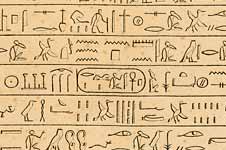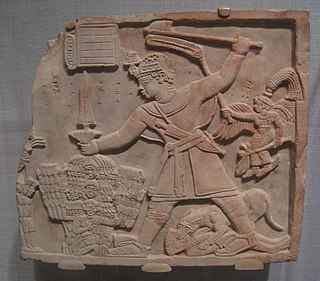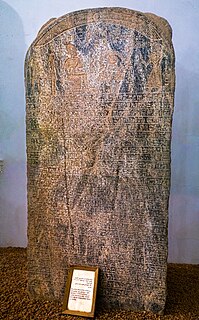 W
WThis is an incomplete list for rulers with the title of Qore (king) or Kandake (queen) of the Kingdom of Kush. Some of the dates are only rough estimates. While the chronological list is well known only a few monarchs have definite dates. These include those leaders who also ruled Ancient Egypt and those who ruled during famous invasions or famous trade expeditions. The others are based on estimates made by Fritz Hintze. The estimates are based on the average length of the reigns, which were then shortened or lengthened based on the size and splendour of the monarch's tomb. The assumption being that monarchs who reigned longer had more time and resources to build their burial sites. An added complication is that in recent years there have been disputes as to which monarch belongs to which tomb.
 W
WAkhraten was a King of Kush.
 W
WAlara was a King of Kush, who is generally regarded as the founder of the Napatan royal dynasty by his 25th Dynasty Kushite successors and was the first recorded prince of Kush. He unified all of Upper Nubia from Meroë to the Third Cataract and is possibly attested at the Temple of Amun at Kawa. Alara also established Napata as the religious capital of Kush. Alara himself was not a 25th dynasty Kushite king since he never controlled any region of Egypt during his reign compared to his two immediate successors: Kashta and Piye respectively. Nubian literature credits him with a substantial reign since future Nubian kings requested that they might enjoy a reign as long as Alara's. His memory was also central to the origin myth of the Kushite kingdom, which was embellished with new elements over time. Alara was a deeply revered figure in Nubian culture and the first Kushite king whose name came down to scholars.
 W
WAmaniastabarqa was a Kushite king of Meroë who ruled in the late Sixth or early Fifth centuries BC, c. 510–487 BCE.
 W
WAmanikhareqerem was a King of Kush who ruled towards during the 1st century AD. In older research he was placed into the 2nd century AD. or possibly earlier.
 W
WAmanikhatashan was a ruling queen of Kush. As a Queen, her proper title was "Kandake". Her pyramid is at Meroe in the Sudan. She was preceded by Amanitenmemide and succeeded by Teritnide.
 W
WAmaninatakilebte was a Meroitic king who ruled in the 6th century, probably between 538 to 519 BC at Napata. He succeeded King Analmaye and was in turn succeeded by King Karkamani. Like others of his dynasty, he was discovered buried among the pyramid chambers at Nuri, specifically Nuri 10. These remains, along with engraved blocks at Meroe, are the only known records of the ruler. Also significant is the gold cylinder discovered with the ruler in this pyramid, not unlike those found buried with King Aspelta in Nuri 8, but the function of which remains obscure.
 W
WAmanineteyerike was a Kushite King of Meroe. His reign is dated to the end of the 5th century BCE.
 W
WAmanislo was a king of Kush dating to the middle of the third century BCE.
 W
WAmanitenmemide was a Nubian king whose throne name was Nebmaatre. His name is written in Meroitic, while his throne name is written in classical Egyptian hieroglyphs.
 W
WAnalmaye was a Kushite King of Meroe who ruled in the 6th century BC.
 W
WAnlamani was king of the Kingdom of Kush in Nubia, and who ruled from 620 BC and died around 600 BC.
 W
WArakamani was a Nubian king of Meroë, who ruled in the early third century BCE.
 W
WAramatle-qo or Amtalqa was a Meroitic king.
 W
WArikhankharer was a crown-prince of Kush.
 W
WArnekhamani was a Nubian king of the Kushite Kingdom in the third century BC. The king is mainly known from his building activity at the Musawwarat es-Sufra temple complex. The main temple complex at this place was built by Arnekhamani, but was never finished. Most likely the king died before completing the temples.
 W
WArqamani was a Kushite King of Meroë dating from the late 3rd to early 2nd century BCE.
 W
WAryamani was a Nubian king.
 W
WAspelta was a ruler of the kingdom of Kush. More is known about him and his reign than most of the rulers of Kush. He left several stelae carved with accounts of his reign.
 W
WAtlanersa was a Kushite ruler of the Napatan kingdom of Nubia, reigning for about a decade in the mid-7th century BC. He was the successor of Tantamani, the last ruler of the 25th Dynasty of Egypt, and possibly a son of Taharqa or less likely of Tantamani, while his mother was a queen whose name is only partially preserved. Atlanersa's reign immediately followed the collapse of Nubian control over Egypt, which witnessed the Assyrian conquest of Egypt and then the beginning of the Late Period under Psamtik I. The same period also saw the progressive cultural integration of Egyptian beliefs by the Kushite civilization.
 W
WBaskakeren was a king of Kush. He was likely a son of King Malewiebamani and the younger brother of King Amanineteyerike. He succeeded King Amanineteyerike to the throne.
 W
WHarsiotef was a Kushite King of Meroe.
 W
WKarkamani was a Meroitic king who ruled in the 6th century, probably between 519 to 510 BC at Napata. He succeeded King Amaninatakilebte and was in turn succeeded by King Amaniastabarqa. Like others of his dynasty, he was discovered buried among the pyramid chambers at Nuri, specifically Nuri 7.
 W
WKashta was an 8th century BC king of the Kushite Dynasty in ancient Nubia and the successor of Alara. His nomen k3š-t3 "of the land of Kush" is often translated directly as "The Kushite". He was succeeded by Piye, who would go on to conquer ancient Egypt and establish the Twenty-Fifth Dynasty there.
 W
WMalewiebamani was a Kushite King of Meroe.
 W
WMalonaqen was a Meroitic king who probably governed in the first half of the 6th century BC. His prenomen was "Sekhemkare."
 W
WNasakhma (Nasakhmaqa) was a Kushite King of Meroe. He was the successor of king Siaspiqa.
 W
WNastasen was a king of Kush. According to a stela from Dongola his mother was named Queen Pelkha and his father may have been King Harsiotef. His successor was Aryamani.
 W
WNatakamani was a King of Kush who reigned from around or earlier than 1 BC to c. AD 20. Natakamani is the best attested ruler of the Meroitic period. He was born to queen Amanishakheto.
 W
WSiaspiqa was a ruler of the Kushite kingdom of Meroë reigning for close to twenty years in the first half of the 5th century BC. Very little is known of Siaspiqa's activities beyond the construction of his pyramid at Nuri, now known as Nuri 4. The pyramid and its chapel have yielded several inscribed stelas bearing his name as well as numerous artefacts suggesting a once rich burial. Nothing is known for certain on the relations between Siaspiqa and his predecessor Amaniastabarqa and successor Nasakhma. Equally uncertain is the identity of his consort, with queen Pi'ankhqewqa buried in the nearby Nuri 29 conjectured for that role.
 W
WTalakhamani was a Kushite King of Meroe during the second half of the 5th century BCE. No prenomen is known, and his nomen is Talakhamani. He may have been a son of Nasakhma and a younger brother of Malewiebamani. It is also possible Talakhamani is a son of Malewiebamani.
 W
WTanyidamani was a Kushite king of Meroë who ruled around 100 BCE.
 W
WTarekeniwal was a Kushite King of Meroe of whom little is known. He likely ruled the Meroitic empire during the 2nd century AD. Tarekeniwal is only known from his pyramid in Meroe. His name appears on the pylon of the cult chapel in front of the pyramid, which was in modern times restored. The chapel and its decoration is still well preserved.
 W
WThe Twenty-fifth Dynasty of Egypt, also known as the Nubian Dynasty or the Kushite Empire, was the last dynasty of the Third Intermediate Period of Egypt that occurred after the Nubian invasion.